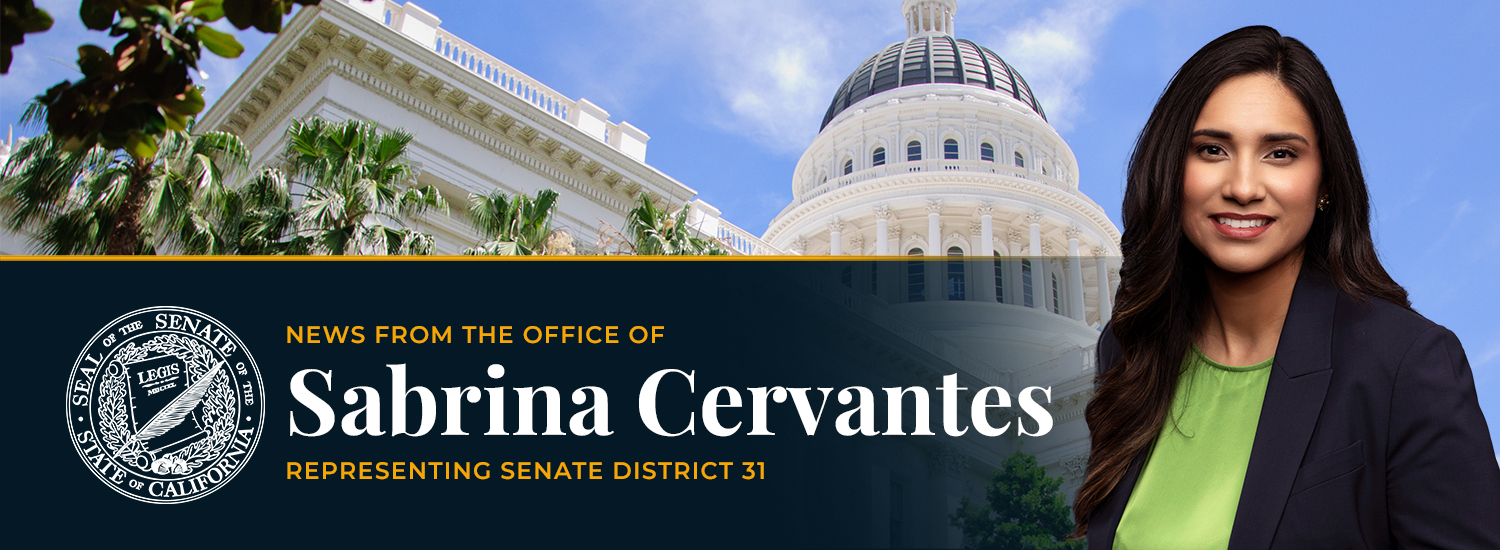
Ten Cervantes’ Bills Reach the Governor’s Desk
Ten Cervantes’ Bills Reach the Governor’s Desk
(RIVERSIDE, CA) --- Senator Sabrina Cervantes (D-Riverside) successfully moved 10 bills to Governor Gavin Newsom’s desk for signature or veto in the first year of the 2025-26 legislative session. One piece of legislation—Senate Bill 280, which called for the November statewide special election—was signed by the Governor in late August, with nine more bills reaching the Governor’s desk for his consideration by the October 13 deadline.
“I am proud to be advancing bills that strengthen elections and voting rights, support public education, protect immigrant communities, ensure responsible safeguards against the misuse of artificial intelligence, and protect the privacy and public safety of Californians,” said Senator Cervantes.
Senator Cervantes’ bills that are on the Governor’s Desk awaiting action:
SB 3 – Reforming the Signature Curing Process. Senate Bill 3 is a follow-up to the March 18, 2025 informational hearing held by the Senate Elections and Constitutional Amendments Committee regarding signature curing in California elections. The bill makes several reforms to the signature curing process, including requiring county registrars to only accept signature cure forms from voters if the form template used was issued by the Secretary of State or a county registrar. SB 3 would also add a statement next to where voters sign on the vote-by-mail ballot envelope declaring that in order for their ballot to count, their signature must be found to compare with the signatures for the voter that the registrar has on file, which can include the signature on their driver’s license or state identification card.
SB 241 – AI Protections for California Community College Counselors: This legislation is a follow-up to Assembly Bill 2370, which Senator Cervantes authored in 2024 as a member of the State Assembly. AB 2370, signed into law by the Governor, prohibited replacing community college faculty with artificial intelligence. SB 241 expands the list of instructor and faculty positions covered by AB 2370 to include, among others, librarians and counselors.
SB 274 – Automated License Plate Recognition (ALPR) System Reform: Senate Bill 274 protects the privacy of Californians while protecting public safety by requiring certain public entities that use ALPR systems to strengthen their safeguards regarding employee access and usage of those systems. The bill also requires the California Department of Justice (DOJ) to conduct annual, random audits of public entities that use ALPR systems to ensure they comply with existing state laws governing their usage. Furthermore, the bill stipulates that any ALPR data collected be retained for no longer than 60 days unless the information is on an authorized hotlist.
SB 292 – Better Preparing Communities for Public Safety Power Shutoffs (PSPS): In orderto address the effects of PSPS on California communities and provide for more effective resiliency planning, SB 292 will require investor-owned utilities (IOUs) to provide the California Public Utilities Commission with detailed reports after PSPS events. The bill also requires publicly owned utilities to submit reliability reports to the California Energy Commission regarding the frequency and duration of service interruptions. Finally, SB 292 requires IOUs to work with representatives of populations with access and functional needs to develop publicly available plans to support those communities regarding PSPS events.
SB 307 – DREAMers Completing Higher Education at UC and CSU: Senate Bill 307 will require the California State University, and request the University of California, to implement additional precautionary measures for undocumented students who are subject to federal immigration enforcement activity. These measures would include the adoption of a systemwide policy that addresses course grades, administrative withdrawal, and reenrollment for undocumented students who are detained, deported, or unable to attend classes due to immigration enforcement activity by federal authorities.
SB 313 – Removing Parental Birthplace on Public Birth Certificates: In response to the growing threat of federal immigration enforcement and weaponization of public data, this bill requires a child’s parents’ places of birth to be included only on the authorized copy of child’s certificate of live birth—which is restricted and contains confidential medical and demographic information—and not on the informational copy, which can be obtained by any member of the public.
SB 670 – Adult Immigration Education – Integration: Senate Bill 670 will clearly define immigrant integration for the purpose of adult education programs. The bill is cosponsored by the California Council for Adult Education and the California Adult Education Administrators Association.
SB 671 – Accessible Pedestrian Signals: In order to continue to make California streets more accessible to the nearly 1.3 million Californians with significant vision loss, SB 671 codifies existing California Department of Transportation policies that require touch-free accessible pedestrian signals, or APS, to be installed at state-owned or -operated crosswalks.
SB 851 –Safeguarding California’s Elections Systems against Federal Intervention: This legislation will help protect California’s elections systems against federal intervention, including for the upcoming November statewide special election. Specifically, federal law enforcement agents would be included in existing prohibitions against arranging for local peace officers to be posted at voting locations or county elections offices without authorization by county registrars. This will protect the essential sanctity of the places where Californians cast their ballots in-person and where their votes are counted. The bill would also protect county registrars from being pressured by the federal government to refuse to certify the results of an election by clarifying that the role of county registrars in certification is ministerial and non-discretionary.